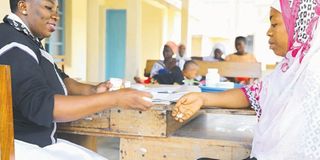Anti-malaria drugs that rural women ignore – at their peril

A registered nurse, Ms Semeni Khalfani (left), serves antimalaria tablets to a pregnant woman, Ms Hidaya Mchombo, 29, at a health centre in Lindi Region recently. PHOTO | THE CITIZEN REPORTER
What you need to know:
WHO recommends that antimalaria medicines must be given to pregnant women at routine antenatal care visits
Mtwara/Lindi. At the eighth month of her pregnancy, Asha Wemba, 37, made the first clinic visit to Ufukweni Dispensary. However, it was well past the recommended time.
Living in Lindi Region - one of the country’s malaria-endemic areas - Ms Wemba had no idea that she was putting her life (and that of unborn baby) at risk of death from Malaria in Pregnancy (MiP).
“MiP has led to many cases of maternal deaths in this region,’’ says Dr Silvia Mamkwe, the Mtwara Regional Medical Officer.
Medics say the risk of malaria infection in pregnant women increases due to changes in hormonal levels and immune system that is why they are required to prevent the disease to protect pregnant women and their unborn babies.
The World Health Organisation (WHO) recommends that antimalarial medicines - Intermittent Preventive Treatment in pregnancy (IPTp) - must be given to pregnant women at routine antenatal care visits whether they carry parasites or not.
“Many women tend to ignore or skip the visits, which is dangerous for both mother and unborn baby,’’ says Dr Mamkwe.
For Ms Wemba, malaria did not pose any threat. She had headache, fatigue and fever, yet it took the effort of a Community Health Worker in her area to advise her to go to the clinic, where she was diagnosed and treated for malaria.
Upon being informed on how untreated malaria during pregnancy could have caused serious complications including death, Ms Wemba vowed to spread the message to other women.
“From now on, I will tell other women to go to the clinic as soon as they realise they are pregnant,” she said.
Her case is not isolated. A number of women across the country are not generally aware of the importance of antenatal clinics and why malaria in pregnancy is fatal.
Yet, a study titled: Monitoring Compliance and Acceptability of Intermittent Preventive Treatment of Malaria Using Sulfadoxine Pyrimethamine after Ten Years of Implementation in Tanzania, said at times the drugs are unavailable to the women.
“We conclude that unavailability of Antenatal Care (ANC) drugs is the major reason hindering the implementation of IPTp-SP,” said a 2017 study published in the Journal Malaria Research and Treatment.
The Tanzania National Malaria Movement (Tanam) says there is a pressing need to raise voices high for women across the country on the importance of attending early antenatal clinic visits and adhering to IPTp.
“But, as a country, we need to change how we are educating the youth; the males and females in the ages of 10 to 18 and 18 to 24,’’ says the chief executive officer of Tanam, Ms Beatrice Minja.
“A number of studies are telling us that less educated women can’t make the right health choices,’’ says Ms Minja, adding: “A stronger campaign on early clinic visits could help awaken the women and help them to prevent malaria in pregnancy.”
Pregnant women and children under five years of age are at high risk for malaria infections, studies show.
Ms Minja - who has been involved in research and malaria community interventions for years across Tanzania - believes that the country’s Coastal Belt, including Lindi and Mtwara, is still highly vulnerable to malaria transmission.
“A large part of the country has reduced malaria. But, there are areas that need intensive work - such as the Coastal Belt,’’ she says, referring to various studies.
A Community Health Worker in Mtwara, Ms Esther Mpinyi - who has been moving from household to household educating women on the importance of early antenatal care - cites the indifference that is facing women in accessing the services.
“There are women who simply ignore. But I have interacted with those who are completely unaware,” says Ms Mpinyi, who received training under the USAID Boresha Afya project.
In the neighbouring region, of Lindi, the Regional Coordinator for Mother and Child Health Care, Ms Zainab Mathradas, says males involvement in promoting antenatal care is a key factor.
“Often, men contribute to social barriers. We can get more women attending the clinics if more men are brought on board,’’ she says.


